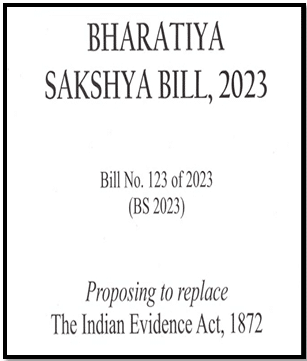BHARATIYA SAKSHYA BILL AND THE BAR ON INQUIRING INTO PRIVILEGED COMMUNICATION
Why in the News?
- Bharatiya Sakshya (BS) Bill, aimed at replacing the Indian Evidence Act of 1872, includes a provision barring courts from probing privileged communication between Ministers and the President.
Source: Bar and Bench
Legal Backing for Constitutional Provision
- The Constitution (Article 74(2)) already mentions this provision, and the government seeks to enforce it through legislation.
- The BS Bill intends to give legal weight to Article 74(2) by incorporating it into the evidence framework.
Undefined “Privileged communication”
- The Bill lacks a clear definition of “privileged communication,” leaving room for interpretation.
- S. Bajpai, part of the government-appointed Committee for Reforms in Criminal Law, emphasizes the need for a precise definition.
Constitutional Provision and Legal Enforcement
- While the Constitution inherently holds this provision, the BS Bill emphasizes and enforces it directly.
- D.T. Achary, former Secretary-General of the Lok Sabha, acknowledges the existing constitutional provision.
Proviso in Section 165
- The BS Bill introduces a proviso to Section 165, dealing with the production of documents on court orders.
- The proviso explicitly states that no court should demand privileged communication between Ministers and the President.
Government’s Oversight on Definition
- The government’s failure to define “privileged communication” leaves the provision subject to interpretation by the courts.
- The lack of clarity raises questions about how courts will interpret and apply this provision in practice.
Parliamentary Standing Committee Review
- The Bill, introduced alongside two other criminal codes, was referred to the Parliamentary Standing Committee on Home Affairs.
- The committee report highlights key changes, including the omission of four sections from the Indian Evidence Act.
Notable Changes in the Bill
- The Bill eliminates British legacy references, replacing ‘Vakil,’ ‘Pleader,’ and ‘Barrister’ with the term ‘Advocate.’
- Section 166 regarding the power of the jury has been deleted in the proposed legislation.

 Source: Bar and Bench
Source: Bar and Bench


